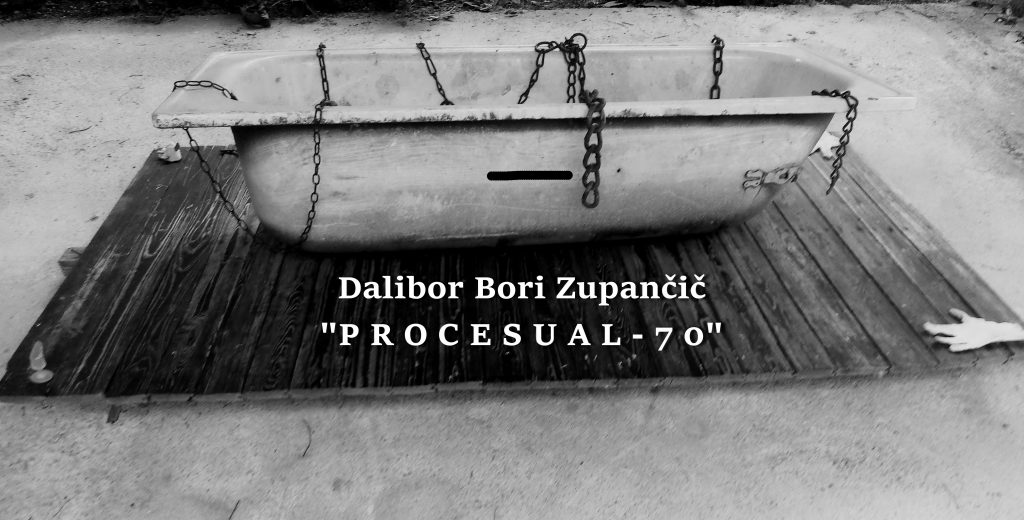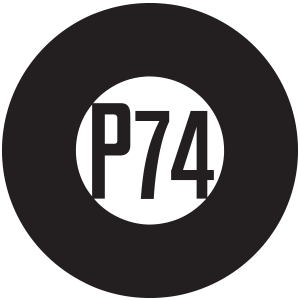
Photo: Dalibor Bori Zupančič
10 September – 1 October 2024
P74 Gallery
>exhibition view @P74 Gallery
You are cordially invited to attend the opening of the exhibition Procesual – 70 by Dalibor Bori Zupančič on Tuesday, 10 September 2024, between 7pm and 9pm at the P74 Gallery in Ljubljana.
_____
_____
The 1970s represent a fruitful and creative period but also one that, due to stereotypical treatments of contemporary art, has been largely neglected. The 1960s and 70s counterculture and subculture have generally suffered the same fate as the avant-garde and neo-avant-garde some decades earlier – that of ignorance and erasure. After the OHO group disbanded, the lively artistic activities continued. Many artistic initiatives were active for the entire decade, living in communes, cultivating multi-media practices, combining various media with performance, social experiments, etc. The younger generations rejected the function of the utilitarian world of adults, consumption, and their institutional demands.
In search of the »total liberation« that Yves Klein strove for in his artistic practice in the early 1960s – termed New Realism by the critics – Dalibor Bori Zupančič, a legend of the Celje conceptual movement of the 1970s, introduced in his public performances a decade later a new label, called »total naturalism«.
In the Total Naturalism manifesto, he wrote:
»Total naturalism represents the existing phenomena as they are and is neither an imitation nor a falsification. It enables us to bring the decisive impulses from life to the level where phenomena begin to occur entirely autonomously, following their own laws. The total naturalistic manifestation includes the entire represented presence, both subjective and objective. Everything is just what it is. It is an art that makes possible not only a view of the Truth but also an insight into the Truth.«
During the Town of Celje public action, which took place between 29 June and 9 July 1973 on the streets of Celje, Zupančič was asked by passersby where and what he was exhibiting. He explained to them that he was exhibiting life, that everything that existed at the time of the exhibition was exhibited, including them and himself. An experimental cultural program was held in the town park. This was a typical countercultural action with elements of anti-institutionalism and neo-Dadaism. The local scene formed a spontaneous artistic practice critical towards mainstream cultural production, institutional apparatus, and state ideology. Art institutions, as well as art criticism, did not perceive these artistic practices as indeed artistic.
In his early years, Dalibor Bori Zupančič was an avid and successful basketball player. His 1974 Slam Dunk in Vitanje performance took place on the outdoor asphalt playground in Vitanje. A slam dunk is one of the essential and attractive elements of a basketball game. This was Zupančič’s most haiku-like public action, depicting a condensed natural moment (the magical moment of levitation) and connecting it to what is happening inside one’s person.
The Then You Know Where You Are action (1975) was a tribute to Bloom’s walk through Dublin, as described by James Joyce in Ulysses. Exactly seventy-one years later (16 June 1975), the artist walked around Celje in a nightgown he found in the suitcases stored in the attic of his home.
The action TRANSCENDENCE, SIBERIA (1976) occurred in Celje’s surroundings, where the artist arranged various objects, including discarded and useless ones, around his home, i.e. in a non-institutional environment, within life itself. It represented his new fantasy world.
The 1979 piece, titled The Lust For Violence, deals with the late 1970s, namely, illusions of a beautiful and better world and the succumbing to weapon-based aggressiveness.
_____
Dalibor Bori Zupančič (b. 1949) is a contemporary visual artist, musician, illustrator and cartoonist. He has recorded several albums with the group Bori & The Young Ones. He first attended elementary school in Celje (II. Elementary School Celje), and after moving to Šmarjeta, in Hudinja. After graduating from high school in Celje, he studied fine arts, first at the Faculty of Education in Ljubljana and then in Maribor. After more than ten years as a freelance artist, he shifted his focus to mental illness and completed a specialisation in art therapy in the Netherlands. Working at the psychiatric hospital in Vojnik, he uses the experience of a musical and literary artist in his work with patients. Zupančič has participated in numerous solo and group exhibitions, including From the Town of Celje, Museum of Modern and Contemporary Art Koroška, Slovenj Gradec (2023); Friends will be Friends, P74 Gallery, Ljubljana (2022); 9th Triennial of Contemporary Art U3: Dead and Alive, Museum of Modern Art Ljubljana (2020); Jeans Generation, Museum of Recent History, Celje (2017); This is a Weapon!, Vodnikova Homestead Gallery, Ljubljana (2016); Living in Celje. Acoustic Intervention Transparency, Museum of Recent History, Celje (2013); Admission Free. Grass, Sparrow, Petrol, Slovenian Association of Fine Arts Societies Gallery, Ljubljana (2013); Drawing in Slovene Comics, City Gallery Ljubljana (2011); Save As, Likovni salon Gallery, Celje (2006); Dalibor Bori Zupančič. Introspective ZZ 1970-2006, Gallery of Contemporary Art, Celje (2006); 26th Biennial of Graphic Arts Ljubljana. The First Line, International Centre of Graphic Arts, Ljubljana (2005).
_____
We extend our sincere thanks to the Centre for Contemporary Arts Celje, Maja Antončič, and Dalibor Bori Zupančič for lending the artworks for this exhibition.
Dalibor Bori Zupančič’s exhibition Processual – 70 is part of the ongoing study series called THE SEVENTIES, which is dedicated to the overlooked and silenced phenomena of visual art and culture in Slovenia during the 1970s. The series began with the exhibition Friends will be Friends in 2022, followed by the SOG (Design and Graphic Section, 1973–1994) and Matjaž Hanžek. A Room of One’s Own exhibitions in 2023, and RIO. Rock in Opposition in 2024.
